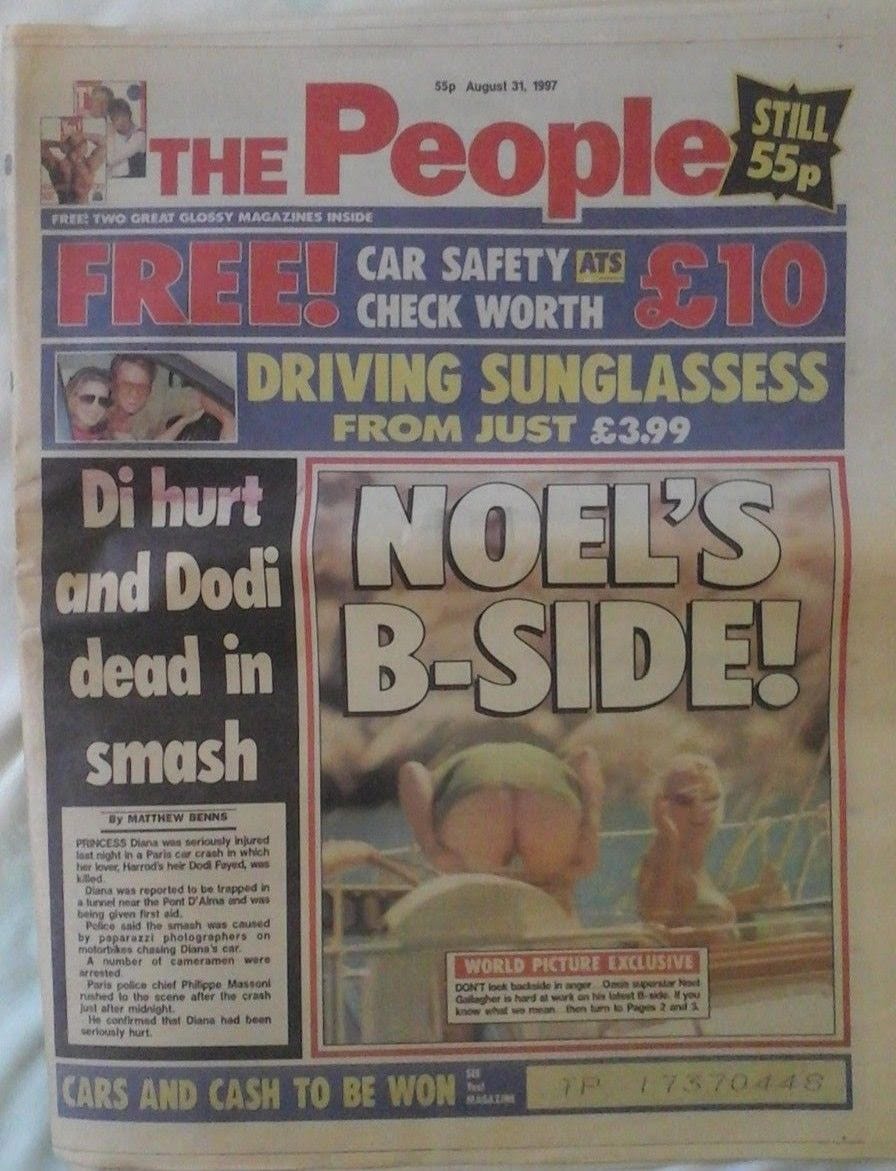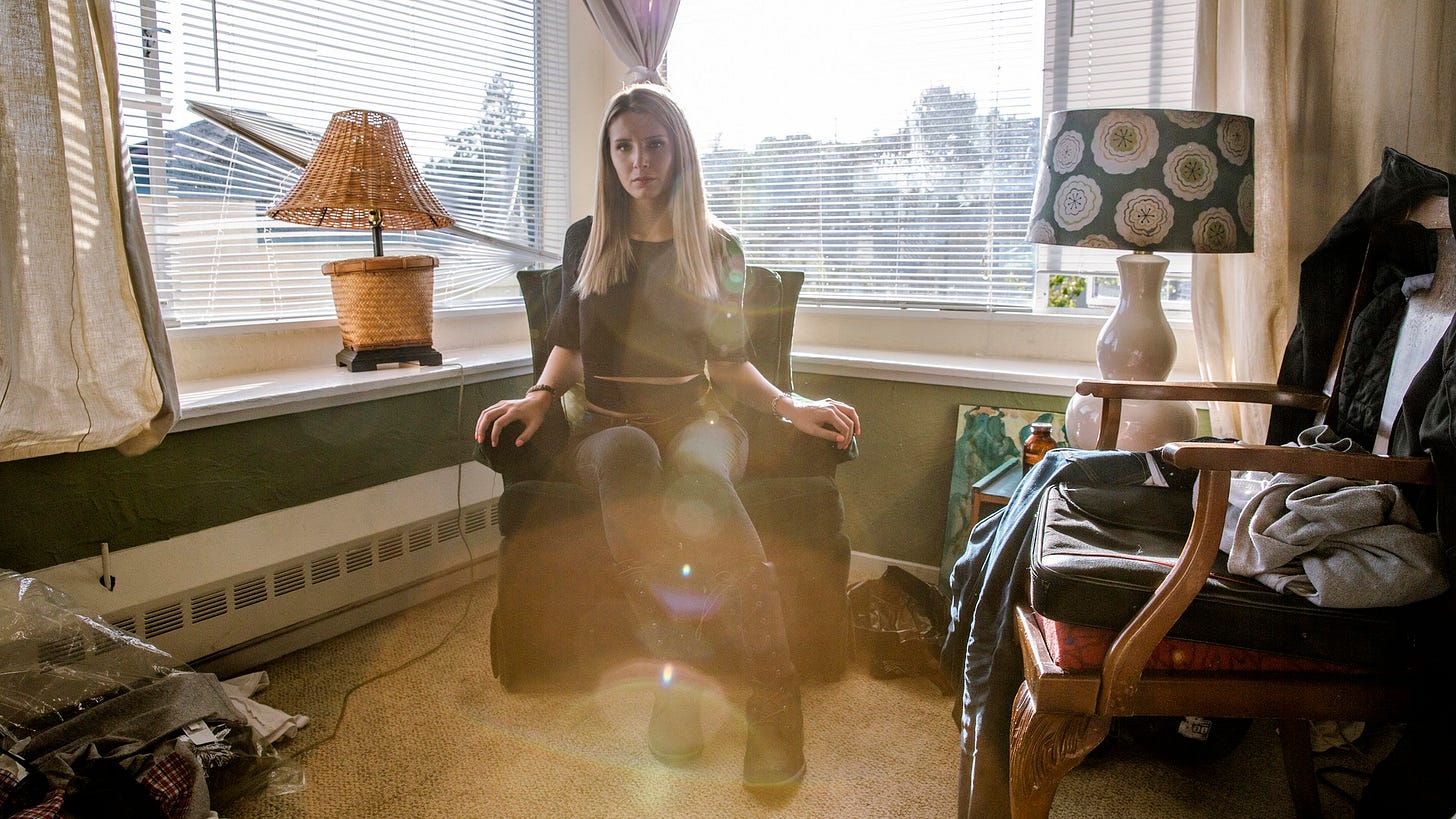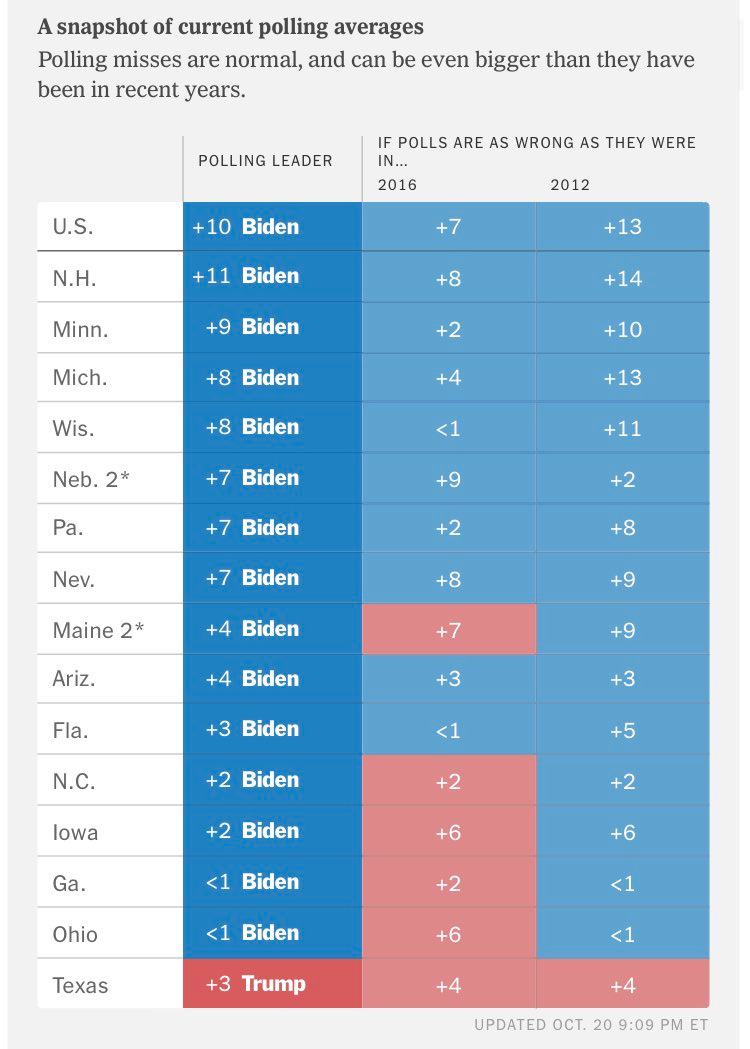Happy Friday!
Because life is pretty miserable right now, I am going to take you back in time to The Best Year in Human History (TM). I heard this story from Peter Sands, who maintains the best trove of historical newspaper clippings in Britain. (Try his weekly news quiz.)
It is the early hours of August 31, 1997. The nation’s Sunday papers have been put to bed, and are now in the hands of the late subs, a lonely breed of men (yes, usually men) who stay up until the final print deadline, usually around 3am, to check that nothing massive happens. If it does, their job is to remake the front page - pretty much on their own - and send it to press. I was the late sub a few times at the Mail in the 2000s; no piece of news ever reached the bar for redoing the final edition, much less - gasp - sending a special edition at 5am.
But for the late subs working that night, this shift was different. Because in the early hours of the morning came some terrible news from Paris. There had been an accident in an underpass, wrecking the car in which Diana, Princess of Wales, had been travelling with her boyfriend Dodi Fayed.
He was dead; she was, at the very least, badly injured.
This presented a dilemma for the late sub at the Sunday People, a newspaper which had spent an extraordinary amount of money for exclusive photos of Noel Gallagher mooning. What to do?
And so I present the world’s best example of the sentiment: don’t do things by half-measures.

I could look at this all day.
Helen
PS. Memory plays tricks: in the 15 years since Peter Sands recounted this anecdote, I had mentally rewritten it to feature this abomination of a front page sitting on every garage forecourt next to all the other papers which had printed a fresh edition. Peter tells me that, thank god, The People eventually printed another edition that night, banishing the buttocks.

Not sure the exclamation mark was necessary, mind you.

Why the Alt-Right’s Most Famous Woman Disappeared (Atlantic)
Lauren Southern had a Phyllis Schlafly problem. Her ostensible allies frequently attacked her as a “tradthot”—an alt-right term for single women who support “traditional” values but don’t live them. (If you look up tradthot in the Urban Dictionary, the first thing you see is a video clip of Southern.) She seemed to sincerely share her movement’s views about the female temperament and women’s rightful roles; at the very least, she was adept at parroting them. She told me that “women biologically hate the stress of work” and that “it sucks being a girl in a feminist world.” “We’ve got an ambition problem as women in politics—we’ve seen so much and experience so much, will we be able to be a housewife?” she said another time. Still, she felt so besieged by the insults directed at her by the alt-right men that she made a response video called “Why I’m Not Married.” She was 22 at the time.
Come for the sad, sad story of what it’s like to be a woman in a racist movement that thinks women should get back into the kitchen, stay for the boyfriend who won’t eat ketchup because it’s “non-European”.
What the 1619 Project Row Is Really About (Airmail)
The [New York] Times is still a great newspaper, and possibly the most respected in the world. But the dirty little secret of modern journalism is that the best and the brightest don’t necessarily want to be in charge of the newspaper of record, let alone second or third in command.
Being the executive editor of The New York Times is not fun. These days, it’s more akin to being the commander of a Nimitz-class nuclear aircraft carrier—prestige and power, sure, but at the cost of huge stress, relatively low pay, little room for error, lots of second-guessing in Washington, and buckets of blame when something goes wrong. At sea, the glamour and glory go to the fighter pilots; in a newsroom, the top guns are writers and columnists with marquee bylines, huge social-media followings, book contracts, and pirouettes on cable news.
For reasons I don’t fully understand, I have begun to follow the row over the NYT’s 1619 Project the way that some people follow professional sports. (For the uninitiated, the key documents are this Washington Post catch-up and Bret Stephens’s column in the, er, NYT.) The tl;dr is that the paper did a big project inviting readers to reconsider American history, looking at the date of 1619 - when the first slaves arrived in what were then British colonies - rather than 1776, when the Declaration of Independence was signed, as the country’s birth.
Trying to follow the arguments about the use of the words “true founding” is liable to make your eyes cross, but the essential division is one familiar to British readers in the debate about empire. Are you proud or ashamed of your country’s history? The 1619ers depict a nation founded on exploitation and inhumanity; the 1776ers gesture to the lofty ideal of a state founded on the premise that “all men are created equal”.
Added to this, the personal is political. The star journalist at the heart of the 1619 project, Nikole Hannah-Jones, is two things: the recipient of a huge amount of abuse and snide jealousy, as well as someone with a track record of snarky, dismissive tweets to, and about, her critics.
The Airmail piece above suggests another personal inflection, which is that there’s a battle at the NYT between white Ivy League men who are all trying to claim the crown of Leading Champion of Diversity. This feels like a familiar reflex across public life.
I’m not qualified to comment on whether Airmail gives a fair depiction of the NYT’s office politics, but what did strike me was the passage above, because I think this dynamic is so true in so many elite left-leaning disciplines right now - academia, journalism, the arts - where there is far more prestige than money, or where entry barriers and insecure work mean that the middle class dominates. Leadership with power with responsibility, whereas there are jobs which offer you power without responsibility. Guess which is more attractive?
Who wants to be the artistic director of a theatre, under constant pressure both from a budgetary black hole and from critics who want new voices rather than reliable (ticket-shifting) stalwarts? In journalism, as the Airmail piece notes, it’s far less stress to be a columnist, than to be an editor. (Believe me.) If you believe Left Out, and I do, Jeremy Corbyn took “present but not involved” to new heights as Labour leader. In academia, would you rather be Niall Ferguson or some hard-pressed vice-chancellor?
Perhaps I’m being too indulgent: leadership positions might be tough, but they still carry a lot of power and patronage. But it feels like another version of the “why are MPs so crap?” problem. Would you honestly want to be a backbench MP?
I sometimes feel that we’ve all become like sulky teenagers: perpetually aggrieved, unreasonable, prone to tantrums. We secretly want someone else to be Mum, and sort everything out for us, but we also want to complain about how that person is DOING IT WRONG.
Department of Things I Can’t Believe I Am Having An Opinion On, And Yet Here We Are, Nonetheless

I found this question interesting, if a little trollish, despite its claims to neutrality. The case being made here is that we string up men for sexual infractions - see the reaction to the New Yorker’s Jeffrey Toobin being caught masturbating on a work Zoom - whereas we’d see women doing the same as harmless, maybe even iconoclastic. I am really not so sure.
This story broke in two spurts (sorry). The first version was just that Toobin was seen “exposing” himself. Then came the additional detail that it was a group call, there was a break in the middle, and when everyone returned, there he was knocking one out, apparently oblivious to the camera.
That certainly affects how I feel about it. First of all, yes, I think a female staff writer doing the same would probably also have been suspended. (Frankly you’d want to be, if the other option was saying Hello to your colleagues in the lift on Monday morning.) Owen Jones once wrote a memorable column defending three judges sacked for watching smut at work - “Who knows, maybe an otherwise tense judge seeking a quick bit of relief will concentrate better” is a line which is branded on to my brain - but most of us agree that orgasms and the office are best kept separate.
However, to use a phrase which is probably no longer allowed, if my auntie had balls, she’d be my uncle. Yes, the initial reaction to Toobin probably was harsher because he was a man. Why? Because people’s minds went to the available cultural scripts for what had happened. They wondered if it was a one-on-one meeting with a junior female colleague, for instance.
They did this, not because of the Misandrist Feminist Agenda, but because of the long and sticky history of sexual harassment. Two recent news stories - Louis CK, and Harvey Weinstein’s adventures with a pot plant - will have leapt to mind. There is also no comparable phenomenon of women terrorising men in public places by jumping out and waving their genitals around, or high-powered women inviting nubile young male comedy acts to their hotel room to discuss career opportunities and getting their bits out. Sexual violence, and the threat of sexual violence as a means to dominate and control women, is asymmetric. Don’t take that up with me. Take it up with rapists.
That said: a word of defence. Had I been on that call, I would have been profoundly embarrassed, for myself but also for him. I wouldn’t have felt scared or coerced or threatened. This isn’t a Louis CK situation: deliberately violating women’s boundaries for your own power trip. (From the sound of it, David Remnick - Toobin’s literal boss - was also on the call. He was violating boundaries with a commendably egalitarian attitude.) Neither is it equivalent to getting flashed in the park, where the fear is: what’s next? Am I safe? Will I end up one of those murdered girls on the news?
Anyway, if you want to be angry about the sex disparity in responses to #ZoomDick, blame Weinstein, not feminism. He’s the reason we reach for the worst possible spin to put on events like this.
Quick Links
“One afternoon, on a group call to celebrate a friend’s good news, somebody said what I didn’t know I needed to hear . . . ‘You look like a lawyer for the N.A.A.C.P. Legal Defense Fund!’” I did not know I needed to read this many words on growing a moustache (New York Times).
Tom Lehrer, aged 92, has put all his sheet music and lyrics into the public domain.
Here are five books I picked to help understand the world in 2020.
“If World War 2 were starting today, World War 1 would feel about as far back to us as 9/11.” (Wait But Why)
I could handle 15 more hours of footage of Joe Biden just being nice to people. (The kid here lost his dad in a mass shooting.)
Oh, I’m Sorry, You Wanted To Sleep At Night?

Don’t think about Florida and see you next time!


